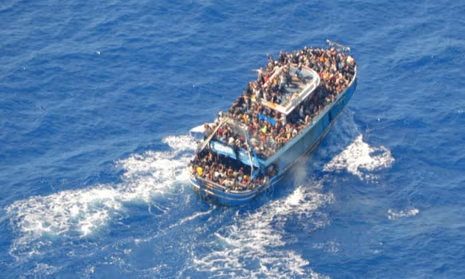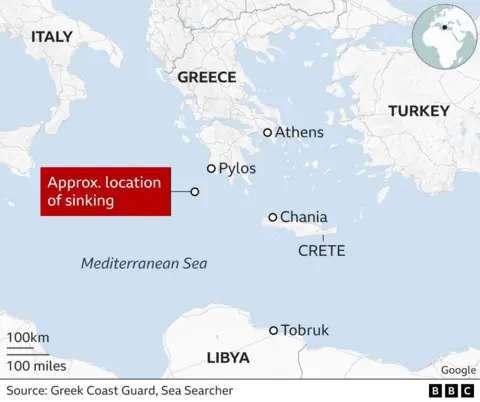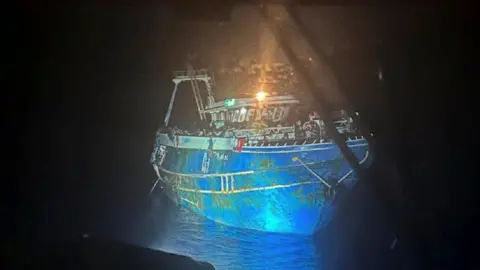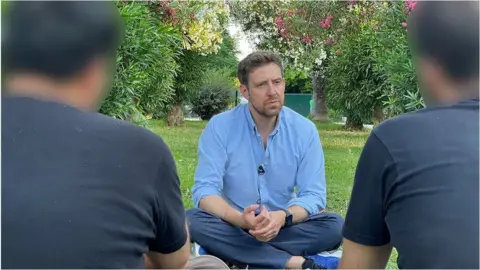
A court in Greece has abandoned the trial of nine Egyptian men accused of causing the biggest migrant shipwreck in the Mediterranean Sea for a decade.
The judges in the southern port city of Kalamata ruled they did not have jurisdiction to hear the case on the grounds the vessel sank in international waters.
It is feared more than 600 people drowned last June when an overcrowded fishing boat, the Adriana, sank on its way to Europe from Libya.
The accused had faced life in prison if convicted of people-smuggling and causing the sinking of the boat. There were cheers among protesters outside the court as the judges’ decision to drop the case became clear.
The indictment seen by the BBC showed that the defendants were being prosecuted on evidence that had already been contradicted by at least six survivors, who said the coastguard had caused their boat to capsize and then pressured them to frame the Egyptians.
Human rights groups, including Amnesty International and Human Rights Watch, said they had strong reservations about the integrity of the Greek investigation and evidence, and questioned whether the defendants would receive a fair trial.
The Greek coastguard has constantly denied their actions brought about the disaster and the authorities have rejected all claims of wrongdoing or of a cover-up. The allegations are being considered by the Greek Naval Court.
Up to 500 feared lost at sea
The nine defendants, who are Egyptian and aged between 20 and 41, went on trial on Tuesday.
The men were all on board the Adriana fishing boat that sank in international waters, but in Greece’s demarcated rescue area – in one of the deepest parts of the Mediterranean – on 14 June last year.
It is estimated the boat was carrying up to 750 migrants when it set off nearly a week earlier from the port of Tobruk in Libya.
Eighty-two bodies were recovered, but the United Nations believes an additional 500 people – including 100 women and children who were in the hold of the boat – may have died.
The court said the men could not be judged on the charge of setting up a criminal organisation and causing a shipwreck, because it happened so far from the Greek coast.
As a result, it declared them innocent of the further charges of illegal entry to Greece and ruled they were not smugglers.
The prosecutor had earlier conceded the defence’s argument there was no legal basis to try the men because the ship went down outside Greek waters, albeit in the demarcated Greek rescue zone.

The Greek coastguard had been following the boat for at least seven hours before the sinking happened, but later said it did not attempt a rescue because the vessel was travelling safely at a “steady speed” and on a “steady course” to Italy – and that passengers were not in danger.
A previous BBC investigation cast serious doubt on these claims.
When the BBC put allegations to Greece’s prime minister last November, Kyriakos Mitsotakis said they were being investigated but that culpability rested with the smugglers.
“Our coastguard has saved tens of thousands of people at sea and we should be grateful for the work they do,” Mr Mitsotakis said.
Condition of the boat central to prosecution case
The indictment, obtained by the BBC, reveals that Greek prosecutors accused the nine Egyptians of causing the disaster by skippering an extremely overcrowded vessel, which they knew posed an obvious danger to life.
It reads: “The fishing vessel was not seaworthy as it was old and badly maintained and not fit to transfer such a large number of people, especially for such a huge distance while there were no life jackets.”
The prosecution argued that each of the defendants took turns to steer the vessel and were all aware that the severe overcrowding on both the deck and in the hold was badly affecting stability.
The indictment also alleged that the nine Egyptian men were part of a smuggling gang and charged each passenger between $4,000 and $8,000 (£3,100 and £6,300) for a spot on the boat.

Claims Egyptian defendants framed
The prosecution’s charges had been based on interviews, conducted by the coastguards themselves, of nine other survivors in the days after the disaster.
No evidence from the other 95 survivors appeared to have been submitted to the court.
Our team previously heard claims that some of the 104 survivors were pressured into identifying the nine Egyptian men as traffickers.
Two Syrian men, who we called Ahmad and Musaab to protect their identity, told the BBC the coastguard had instructed them to keep quiet about other factors in the disaster and instead to blame these nine men.
“They were imprisoned and were wrongly accused by the Greek authorities as an attempt to cover their crime,” said Musaab.
In separate interviews in Athens, four other survivors said they believed the Egyptians were paying passengers like them and had been framed.
But other survivors are said to have stated they were indeed mistreated by some of the accused – who have been referred to as the Pylos Nine, drawing on the name of the Greek town of Pylos near the location of the sinking.
Allegations against Greek coastguard not mentioned in indictment
In the weeks after the disaster, multiple survivors claimed that a Greek patrol vessel had in fact caused the migrant boat to capsize in a last-ditch, botched attempt to tow it.
This allegation was not mentioned anywhere in the court indictment, despite the United Nations previously saying the claims merited an independent investigation.
Ahmad and Musaab, who spoke to the BBC last year, claimed they were silenced and intimidated by Greek authorities after suggesting the patrol vessel caused the sinking.
“They attached a rope from the left. Everyone moved to the right side of our boat to balance it,” said Musaab. “The Greek vessel moved off quickly causing our boat to flip. They kept dragging it for quite a distance.”
In total, six survivors described independently to the BBC – in near identical detail – how coastguards caused their boat to capsize.

Mobile phone evidence not examined
No video from onboard the Adriana has ever emerged, let alone the moment of sinking.
The coastguard said their own high-specification cameras were not recording.
Some survivors said they at times had been filming while onboard, but that coastguards confiscated their mobiles shortly after they were rescued.
These phones were apparently then lost before being found, almost a month later, in a bag onboard the one coastguard vessel that had been present at the sinking.
Defence lawyers had requested that some phones be examined for potentially useful evidence, but court documents obtained by the BBC show the investigating magistrate ruled last year that this would be a futile exercise – because a “self-evident consequence” of the migrant falling into the sea was that their phones would have all been irreversibly damaged.
“The sea water has entered the confiscated phones which resulted in the inability to extract any kind of stored digital data from them and as such [attempting to extract data] is pointless,” it was said.
Greek military investigation ongoing
The separate Naval Court investigation into the potential liability of the coastguard opened in the weeks after the disaster, but it remains at the preliminary stages.
Human rights groups believe this should be concluded before any criminal trial of the Egyptian defendants.
Christos Dimopoulos, director of Amnesty International Greece, said: “The criminal court will probably have incomplete information in assessing the culpability of the defendants. There is a real risk for the trial to be based on incomplete and/or questionable evidence.”
The Greek government, which has vowed to hold smugglers to account and to crack down on illegal crossings, has said justice will be done.
Meanwhile, Judith Sunderland, associate Europe and Central Asia director at Human Rights Watch, said: “Credible and meaningful accountability for one of the worst shipwrecks in the Mediterranean needs to include a determination of any liabilities of Greek authorities”.





